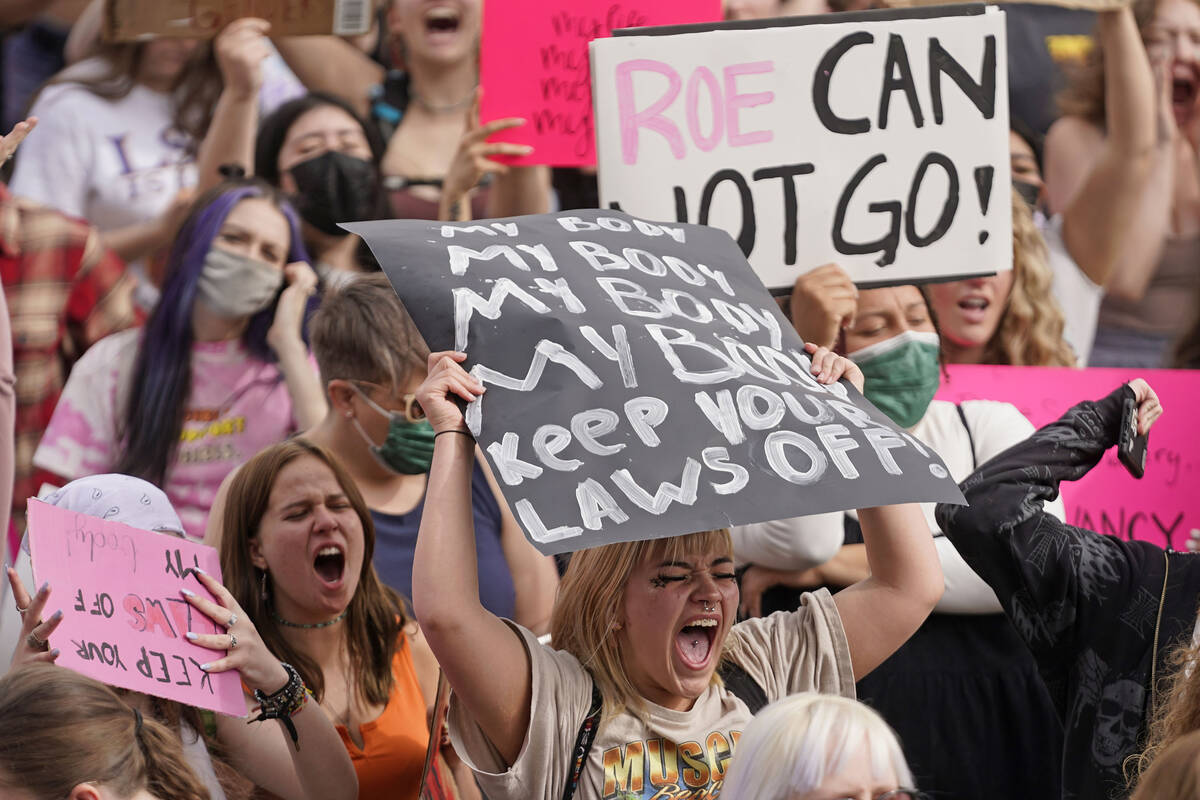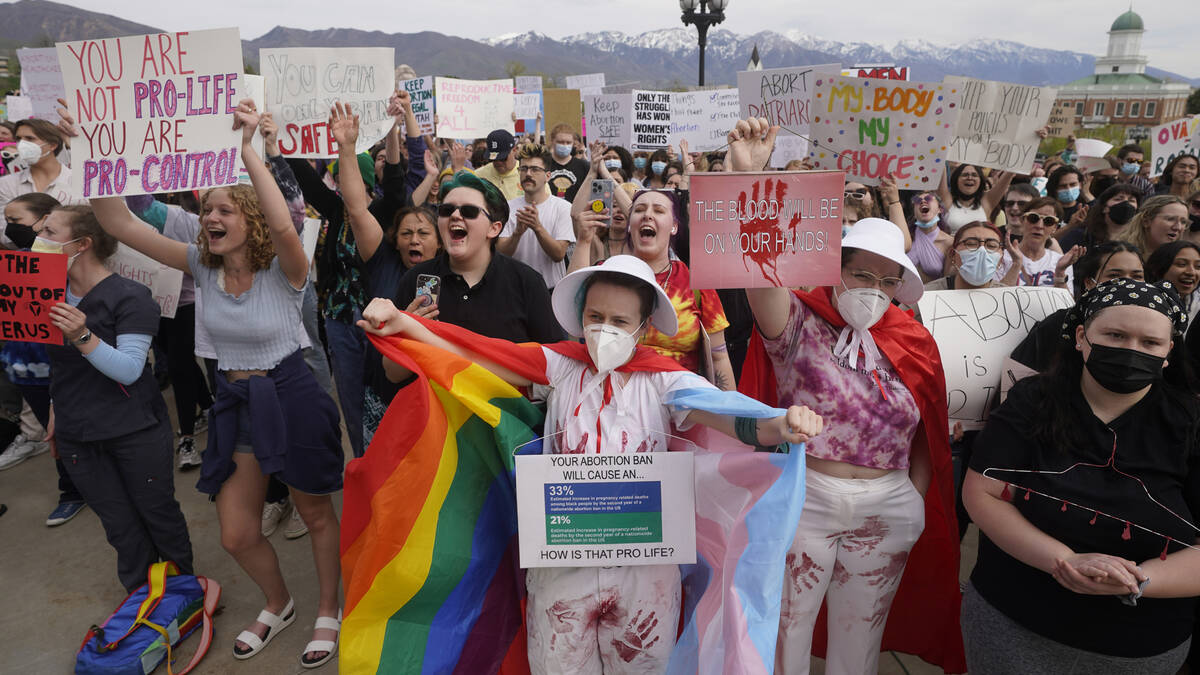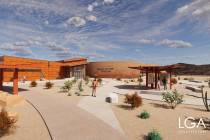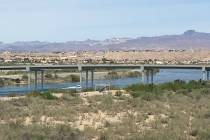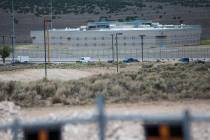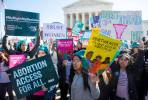In Nevada, Planned Parenthood prepares for influx of abortion patients
With the U.S. Supreme Court overturning Roe v. Wade, Nevada should expect to see an influx of patients from neighboring Arizona, Idaho, Utah and other states poised to further restrict abortions or ban them outright, Planned Parenthood representatives said.
“I think that we’re going to see that (influx) in any state that’s able to maintain access to abortion, should Roe v. Wade fall,” Dr. Kristina Tocce, medical director for Planned Parenthood of the Rocky Mountains, said earlier this month.
Planned Parenthood expects its abortion volumes to increase by 80 percent — or by 10,000 patients — in the Rocky Mountain region, which includes Southern Nevada, Colorado and New Mexico.
The dramatic increase is projected in large part due to the move by Texas to outlaw abortions, Tocce said. In 2019, 55,966 Texans received abortions in that state, according to Texas Health and Human Services.
A 2021 Texas law has ended most abortions there by permitting civil lawsuits against anyone performing an abortion once a fetal heartbeat can be detected, which is at about six weeks, Tocce said. Despite an exception for when a pregnancy is life-threatening, she recounted how a woman who could not receive chemotherapy for recurring cancer until her pregnancy was terminated had to travel to Colorado to obtain an abortion.
However, in most of the country, abortions had remained legal up until a fetus can survive outside the womb, which is generally at about 24 weeks. With Roe v. Wade overturned, states can enforce greater restrictions, and at least half are moving in this direction.
The right to an abortion is not in immediate jeopardy in Nevada. A 1990 voter referendum codified in law abortion rights in Nevada, one of more than a dozen states with such protections in place.
To handle increased patient volumes, the two Planned Parenthood centers in Southern Nevada are adding staff and increasing their hours, Tocce said. There are no immediate plans to increase the number of centers here or add centers near borders with other states.
Already regionally, “We have seen our wait times for scheduling increase dramatically,” she said. A delayed appointment could preclude a woman from ending a pregnancy using medication or compel her to travel to a state where she can get an earlier appointment.
In Nevada, there were 8,414 abortions reported in 2019, according to the anti-abortion Charlotte Lozier Institute, citing Nevada Department of Health and Human Services’ data.
Arizonans ‘already fleeing’
Arizona women already are seeking abortions in states where there are fewer restrictions, with recent data showing that hundreds have traveled to San Diego, said Brittany Fonteno, president and CEO of Planned Parenthood Arizona.
Unlike California or Nevada, Arizona requires a 24-hour waiting period, a “medically unnecessary” ultrasound and that doctors read to patients a script that Fonteno described as stigmatizing.
“We have seen that because of these onerous requirements that are, again, medically unnecessary, that some of our patients in Arizona are actually already fleeing the state in order to get … accessible abortion care,” Fonteno said.
Arizona has a law on the books banning abortions that precedes Roe v. Wade but that has not been enforced since the landmark decision invalidated it. Now that Roe has overturned, it remains unclear whether the old law would be enforced. Meanwhile, Arizona Gov. Doug Ducey in March signed into law a measure that would ban most abortions after 15 weeks, with limited exceptions for medical emergencies but not for rape or incest.
In 2020, 13,186 abortions were reported in Arizona, all but 636 performed before 15 weeks, according to state data.
Should abortion be further restricted in Arizona, Fonteno expects that Southern Nevada would see an influx of patients from northern Arizona. She also expects that the increased demand would cause a ripple effect, where Nevadans could experience delays in services, including for family planning and birth control.
‘Trigger’ laws in Utah, Idaho
Nevada could also see patients from Utah, which adopted a so-called “trigger” law that would go into effect if Roe v. Wade is overturned.
The law, passed in the waning days of the state’s 2020 legislative session, would automatically ban abortions at any stage of pregnancy except in cases of rape or incest, if the woman’s life is at risk, and when there are certain fetal anomalies, said Karrie Galloway, CEO and president of Planned Parenthood Association of Utah.
Utah already has a 72-hour waiting period and requires that a woman receive state-mandated abortion information delivered face-to-face by a health care provider.
Utah is “always at the forefront of incrementally restricting women and pregnant people’s access to abortion,” Galloway said. The state has one of the lowest abortion rates in the country, with fewer than 3,000 performed a year, she said.
Surgical abortions are performed only in Salt Lake City. Medical abortions, where medication is used to end an early pregnancy, are available in Logan, Utah.
If a ban goes into effect in Utah, some women will seek abortions in neighboring Nevada and Colorado, Galloway said. Colorado permits abortions at any stage of a pregnancy.
As Idaho moves to criminalize abortions, women from that state already are seeking abortions in northern Utah, Galloway said.
In March, Idaho Gov. Brad Little signed into law a measure similar to the one in Texas allowing civil lawsuits against medical professionals who provide abortions after fetal cardiac activity can be detected. The law, which has been challenged in court by the regional Planned Parenthood, remains on hold.
In 2020, the Idaho Legislature passed a trigger law that if Roe v. Wade were overturned it would make it a felony to perform an abortion or attempt to do so.
Liberal laws
The other two states bordering Nevada, California and Oregon, have some of the most liberal abortion laws in the country.
Gov. Gavin Newsom told the Associated Press in December that he hoped to make California a “sanctuary” for out-of-state abortion seekers, with a panel he convened recommending that the state even pay for their travel and lodging.
California is one of half a dozen states requiring private insurance companies to cover abortions. On Wednesday, Democratic lawmakers announced they are seeking to enshrine abortion protections in the state’s constitution.
In Oregon, abortions are permitted up to birth.
Contact Mary Hynes at mhynes@reviewjournal.com or 702-383-0336. Follow @MaryHynes1 on Twitter.
RELATED
Abortion-rights backers protest Roe ruling in Las Vegas
'This will not stop here,' Titus says after abortion ruling
Some fear rollback of LGBTQ, other rights after Roe ruling
Can I still get an abortion in Nevada? Abortion questions, answers.
Religious leaders in Las Vegas Valley react to Supreme Court ruling



